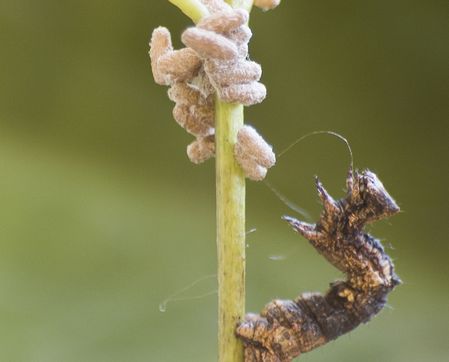The Voodoo Wasp
Not content with laying its eggs inside a caterpillar's body, a parasitic wasp then turns the host into a zombie babysitter

Let’s hope the Glyptapanteles wasp continues to find caterpillars tastier than humans — otherwise mankind might be in some trouble. As if laying 80 eggs inside of a caterpillar’s body weren’t bad enough, a new study published by the Public Library of Science details how the wasp larvae then take over the mind of the caterpillar, turning it into a zombie-like bodyguard.
After the wasp impregnates a caterpillar with its eggs, the behavior of the host caterpillar begins to radically change. First the caterpillar stops moving. Then, after the eggs hatch and the pupae crawl out of the caterpillar’s body, the caterpillar involuntarily protects the pupae from attack by thrashing wildly in the presence of predators. Although the exact biochemistry used by the wasp larvae to transform an otherwise benign caterpillar into a Manchurian Candidate-like slave remains unknown, the researchers did show that the presence of a zombie caterpillar guardian performing “violent head-swings” significantly increased the survivability of the pupae.
While Glyptapanteles isn’t the only wasp to gestate its young inside a living host (the tarantula wasp also reproduces Alien-style) and isn’t the only parasite to affect host behavior (toxoplasmids make people more attracted to cats), Glyptapanteles is the first known insect to combine those two gruesome tactics. If only humans could crack the wasp’s secret, it might make day care a whole lot easier to find.
[Via PLoS]